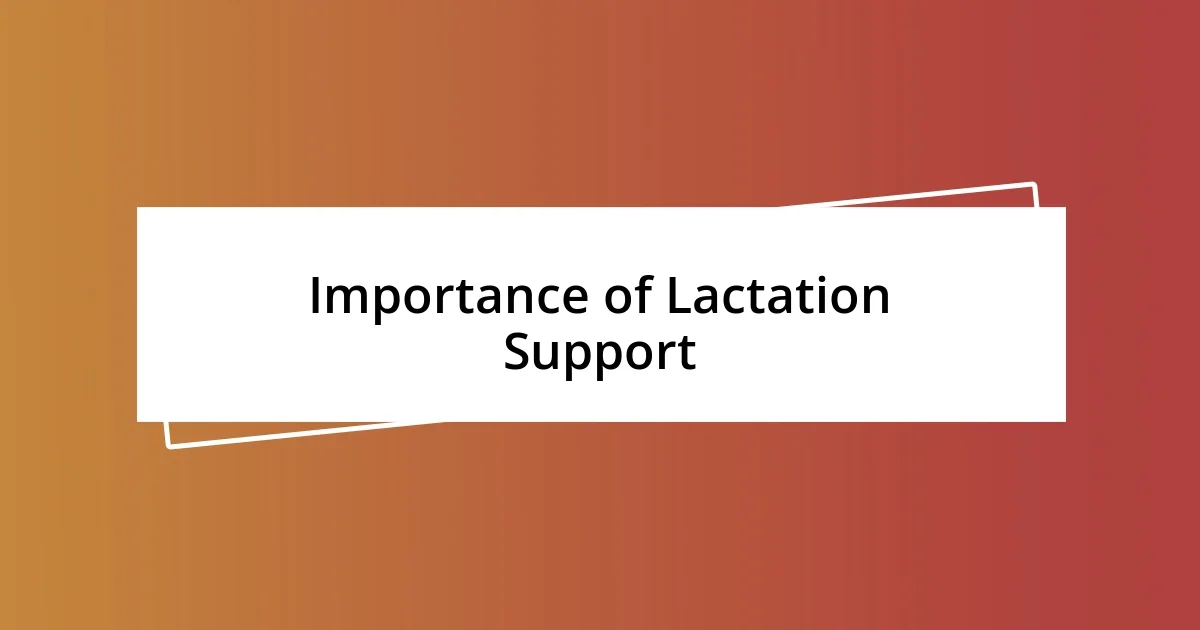Key takeaways:
- Lactation consultants provide essential emotional support and personalized guidance to help mothers build confidence in their breastfeeding journey.
- The consultation process involves an initial assessment, real-time observation, and a follow-up plan for ongoing support and adjustment.
- Practical tips like creating a comfortable breastfeeding space, reaching out for help, and keeping a journal enhance the breastfeeding experience and emotional well-being.

Introduction to Lactation Consulting
Lactation consulting is a specialized field that focuses on supporting breastfeeding mothers with practical guidance and emotional encouragement. I remember feeling overwhelmed during my early days of nursing, and having someone knowledgeable by my side made all the difference. It’s incredible to think how much a lactation consultant can help in navigating challenges like latching difficulties or concerns about milk supply.
When seeking help, I found myself asking, “Is this normal?” and “Am I doing this right?” Those questions can swirl in a new mother’s mind, often leading to stress and self-doubt. A skilled lactation consultant can not only provide answers but also help you build confidence in your breastfeeding journey. They bring a wealth of experience, offering tailored advice based on individual circumstances, which can be a game-changer.
What often struck me was how these professionals meet you right where you are emotionally. My consultant took the time to listen and reassured me that the struggles I faced were common and manageable. This kind of empathetic support is essential—it transforms the lactation experience from merely a physical task into a personal and nurturing bond between mother and child.

Importance of Lactation Support
Lactation support is vital, especially in those early days when everything feels new and daunting. I vividly recall the late nights when I was unsure if my baby was getting enough nourishment. Just knowing that I could reach out to my lactation consultant brought me immense relief. Their role is not just about addressing logistical concerns; it’s about empowering mothers to trust their instincts and feel connected to their infant.
Key reasons why lactation support is essential include:
- Building Confidence: A consultant can help solidify a mother’s confidence in her ability to breastfeed, reducing feelings of inadequacy.
- Personalized Guidance: Every breastfeeding journey is unique; tailored advice ensures that specific problems are addressed effectively.
- Emotional Reassurance: The emotional side of breastfeeding is crucial, and having someone validate your experience can uplift your spirits immensely.
- Practical Solutions: From latching techniques to managing nipple pain, a consultant provides actionable solutions that make a significant difference in daily life.

Steps in the Consultation Process
The consultation process typically starts with an initial assessment, where the lactation consultant gathers information about the mother’s medical history and the baby’s feeding patterns. I remember my consultant asking a variety of detailed questions, creating an atmosphere where I felt comfortable sharing my concerns. This specific step is crucial; it sets the stage for personalized advice that addresses the unique elements of each breastfeeding journey.
During the consultation, the lactation consultant observes the breastfeeding session, offering real-time feedback. This hands-on approach was invaluable for me; I still recall how they gently corrected my positioning with simple adjustments that made a world of difference. Observations and tailored recommendations empower mothers to enhance their breastfeeding experience while building confidence.
After the session, it often involves a follow-up plan, ensuring continuous support and encouragement. My consultant checked in regularly, and those messages meant a lot—like a reassuring hand on my shoulder reminding me I was not alone. Having that ongoing support helped me navigate through the unexpected challenges that came my way, significantly boosting my breastfeeding success.
| Step | Description |
|---|---|
| Initial Assessment | Gathering the mother’s medical history and baby’s feeding patterns to tailor advice. |
| Observation and Feedback | Real-time assessment of breastfeeding sessions providing hands-on guidance. |
| Follow-Up Plan | Continuous support through check-ins and adjustments based on progress. |

Practical Tips for New Mothers
When I look back on my early days as a new mother, one fundamental tip stands out: don’t hesitate to reach out for help. I remember feeling overwhelmed and questioning if I was doing things correctly, yet every time I contacted my lactation consultant, I felt an immediate sense of relief. It’s important to remember that seeking guidance isn’t a sign of weakness—it’s a proactive step toward ensuring both you and your baby thrive.
Another practical tip I swear by is to create a comfortable breastfeeding space in your home. I found that having a dedicated spot with pillows, a cozy blanket, and a glass of water made the experience not only more comfortable but enjoyable. Have you ever considered how a simple environment change can uplift your spirits? I discovered that this little sanctuary could transform stressful feedings into peaceful bonding moments.
Lastly, keep a journal of your breastfeeding journey. I started jotting down my thoughts, challenges, and wins, which not only helped me track progress but served as a wonderful emotional outlet. Reflecting on those entries made me appreciate my growth and resilience. Have you ever realized how documenting your feelings can boost your emotional well-being during such a transformative time? This practice can be a beautiful reminder of how far you’ve come, even on the toughest days.

Overcoming Common Breastfeeding Challenges
Navigating breastfeeding challenges can feel daunting, but I found that tackling issues like latching difficulties often starts with patience. There was a moment when my little one just wouldn’t latch, and I felt frustration creeping in. However, taking a deep breath and allowing myself to step back helped. My consultant suggested slowing down and trying different positions, which truly transformed our feeding experience. Have you noticed how a simple shift in perspective can lead to a solution you may not have considered?
Another common obstacle is engorgement, and I remember feeling like I couldn’t find relief. Those hard, tender breasts were a source of discomfort and concern. My lactation consultant taught me about warm compresses and gentle massage before feeding to alleviate pressure. Incorporating those tips made a significant difference, and I genuinely felt a sense of control over my body that day. How often do we overlook the power of small, mindful actions during such stressful times?
Lastly, I faced challenges with my milk supply and felt a wave of anxiety wash over me. I distinctly recall my consultant reassuring me that fluctuations are normal and that consistent feeding and skin-to-skin contact could help. I began to put those recommendations into practice, and it felt empowering to take proactive steps. Have you ever experienced that rush of relief when you realize you’re not alone in your struggles? It truly highlights the importance of having experienced support by your side during the ups and downs of breastfeeding.













